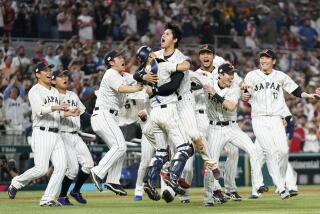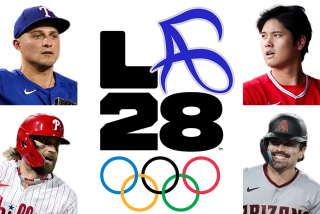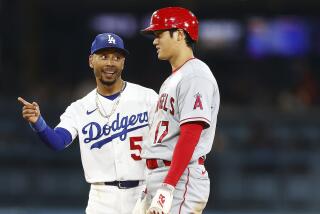Cuba, Soviet Union Seek U.S. Help in Baseball
- Share via
HAVANA — Cuba, whose national baseball team dominates international competition, wants help from the United States to further develop baseball in Cuba and the Soviet Union.
The United States will act on the request later this year when a group of Soviet coaches visit the United States to watch several college games and the major league playoffs.
“This is something very dear to my heart,” said Dick Case, executive director of the U.S. Baseball Federation. “We decided to take the initiative by bringing several of their coaches over and breaking ground on this.
“Cuba and the United States are working to promote baseball worldwide, but we’ve been very low-keyed about it. We want to make sure to do the job right.”
Case said Scott Bollwage, development director of the USBF, is expected to meet with Cuban officials during the U.S. Pan American baseball team’s trip to Havana to discuss several issues concerning the assistance program.
The idea of helping the Soviets first arose in 1982 when USBF president Robert Smith and other baseball officials were in Europe to persuade the International Olympic Committee to accept baseball as an Olympic sport.
“We met with (Cuban Olympic Committee President) Manuel Guerra and got to talking about baseball in the Soviet Union,” Case said. “We were looking to get their vote because we needed it. They had no objections since Cuba is an ally and a potential gold medal winner.”
Felix Moya, vice president of the National Sports Institute in Cuba, recently said U.S. and Cuban officials are helping the Soviets translate a baseball rule book. But equipment is a problem, Case says.
“We heard of a group from a car factory near Moscow that was playing baseball on a hockey field,” Case said. “The catcher was wearing a goalie mask and using a hockey chest protector. But with the Russians, they’ll find 20 elite athletes, have them concentrate solely on baseball and end up like their basketball team, which is pretty good.”
In return for the help, Case hopes U.S. interest in amateur baseball will increase. Because of professional baseball, the top players--some just out of high school--are drafted by major league clubs. The United States sends new teams into international competition continously.
The 1984 U.S. Olympic team, considered one of the best ever assembled with the likes of Cory Snyder, B.J. Surhoff and Mark McGwire, did not play the Cubans because of the communist bloc boycott of the Los Angeles Olympics. A new U.S. team was assembled for the world championships.
Some of those Americans did play on the team that lost twice to Cuba at the 1983 Pan American Games but the U.S. Olympic team was considered a stronger threat to the Cubans.
Case is concerned because baseball will become a full medal event at the 1992 Olympics.
“I think you’ll find by 1992 that the public is going to wake up to what’s happening on the international scene,” he said. “The United States may not be in the Olympics; can you imagine our national pastime not being there? The American public will demand that we do something to have our best players available. The attitude will be that our players should go for the gold as well as the green.”
Several major league teams have cooperated by allowing athletes to play with U.S. amateur teams but generally like to get players into their farm systems as soon as possible.
Cuba and Nicaragua have already sent coaches to the Soviet Uniton to develop baseball, repayment for Soviet help in the early 1960s for developing sports programs. U.S. coaches have helped develop rising programs in Japan, Taiwan and South Korea, and the Cubans feel the United States has the best coacing and conditioning techniques in the world.
“I think you’re seeing more muscular players from the Asian countries,” Case said. “That’s the result of conditioning programs we help implement. Those players who won Little League championships are now 24, 25, 26 years old and turning out world-caliber teams.”
Since Cuba’s borders were closed, the country has kept its tremendous raw talent and dominated amateur play, Case said.
“But weight-training and specialization, particularly in pitching, have gone astray,” he said. “Their pitching is just not what it is in the U.S., Canada or Japan. Cuba is still playing the way they did 25 years ago and they have been successful, but they want to develop.
More to Read
Go beyond the scoreboard
Get the latest on L.A.'s teams in the daily Sports Report newsletter.
You may occasionally receive promotional content from the Los Angeles Times.






